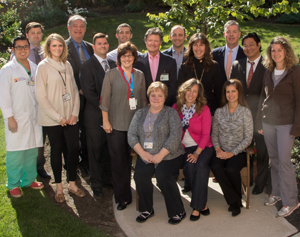What does “value” mean? Value refers to the relative worth, merit or importance of something or someone, and it certainly can refer to financial or material worth. Something or someone that is “valuable” is often held in high regard. Something of high value often demonstrates excellence or is of high quality. Someone of value is regarded with high distinction and honor. Their presence or opinion would be expected to carry weight, and something or someone valuable would usually be treated with respect and admiration.
With Devaluation Comes Depreciation
In the 1990’s, when I grew up in neurosurgery, neurosurgeons were still treated with respect and admiration by hospital administration. I hear so often from my neurosurgical colleagues that their hospitals do not “value” their services. I listen to their frustration when they tell me that they cannot figure out how to calculate their “value” to their hospital. It is my opinion, that when physicians surrendered control of hospitals to business administrators, many of these “officers” of the hospital devalued physicians and surgeons, and with this devaluation, came depreciation. Whether or not this devaluation occurred purposefully may be unique to the hospital or administration.
Let’s start with our non-operative days, or clinic days. Think about how many patients we see in our private offices where we accept public insurance. I see hundreds of children a year in my private office and accept Medicaid and Medicare and other insurance plans. I am “out-of-network” for some health insurance plans, but now, about 80 percent of my patients have managed Medicaid. When I came to Morristown Medical Center, there were approximately five pediatric neurosurgical cases a year. I started a craniofacial program in 2007. There was no support from the hospital. When I asked the chair of pediatrics for support and received none, I started the program in my office with support from my friends, other physicians and surgeons.
A few months later, the hospital demanded that we “move” the clinic to the hospital, but again gave no support. The doctors who comprise the team have donated thousands of hours of work to this craniofacial multi-disciplinary center, and we still have almost no support from the hospital. The hundreds of children that come through the clinic are there because of the surgeons and doctors who support the team effort. Most of the children we see need therapies, such as speech and swallowing, physical and occupational — all done in the outpatient centers owned by the hospitals. The imaging studies are also done at the hospital facilities. The surgeries we recommend are all done at the children’s hospital. Each office visit is now billed by the hospital.

In 2007, I started a pediatric brain and spine tumor center and a spasticity and gait disorder center. These multi-disciplinary centers have provided high-level, collaborative care to thousands of children over the years. We have provided care and guidance, not just to our patients, but to their families and the surrounding community.
How “Valuable” Are a Neurosurgeon’s Patients to a Hospital?
The patients admitted through the emergency room that require neurosurgical consults are never turned away. They are seen, evaluated and always treated regardless of ability to pay and regardless of their risk level or co-morbidities. Trends that will develop as the Center for Medicare & Medicaid Services (CMS) continues to track complications that are, in many cases, caused by patients’ unique co-morbidities, include the tendency to refer more complicated patients (those “high-risk” patients) to other physicians. Especially when the reimbursement for our complicated surgeries is painfully low, it becomes ever more difficult for us to accept the medical malpractice liability associated with a high-risk patient with little or no insurance. Nevertheless, the presence of the neurosurgeon allows the hospital emergency room the ability to triage, evaluate and treat these complicated patients with acute and chronic neurological disorders. We have saved millions of patients’ lives through shunt surgeries, craniotomies for head trauma and vascular surgeries. We don’t discriminate, we treat all patients the same, and we are always there, on call and present in the hospital.
On our surgical days, we start our cases early and usually work all day long, case after case, patient after patient. Our patients are often the most complicated and sick patients in the hospital. They have the highest diagnosis related group (DRGs). DRGs are used to classify (or rate) patients for the purpose of reimbursement of hospitals. Hospitals are paid by the complexity of each patient, which is reflected in their respective DRG. So we admit the most “valuable” patients to the hospital and in turn they bill for their facility and other service fees.
Often a day in a “floor bed” will cost a few thousand dollars, whereas the hospital may charge $10,000 to 20,000 a day for an intensive-care unit bed. This does not include the fees for phlebotomy, laboratory services for blood chemistries or blood cell counts, etc. A CT of the head should be about $500-1,000, and an MRI study is billed at a few thousand. These charges are known as “facility fees,” and are not the professional service charges for interpretation services, such as those provided by the intensivist, the radiologist, the pathologist or the other therapists. We provide the hospital the ability to care for these patients and we do it well, and yet, are devalued still.
Should More Physicians Become Involved in Hospital Administration?
Many of the neurosurgeons in my hospital are leaders. We are leaders in our communities, in our region and in our state. We serve on many hospital committees. We donate our time, our efforts and our lives, caring for our patients. We are some of the hardest working, most dedicated, most demanding surgeons in the hospital. As a mature person and retrospective individual, I am constantly challenging myself to become better, stronger and more intelligent. I read constantly, and I write often. I am constantly criticizing myself, trying to understand my limitations and imperfections, so that I can be better for my own children and better for my patients.
I know that my patients value me, and to their parents, I am invaluable. I am impatient and sometimes, intolerant. I demand and expect the best performance possible. I do not react well to laziness and inattention to detail. I can accept innocent ignorance, but I cannot accept — nor excuse — indifferent ignorance. However, many of my imperfections — my obsession with perfection and my compulsivity to continually strive for improvement — actually increase my value to my patients. I am often saddened how some hospitals have devalued great surgeons because they won’t conform to “mandated” and senseless rules and regulations.
I am shocked at how hospitals now “value” doctors who conform without question, regardless of their ability to perform as a surgeon or physician. As physicians and surgeons who provide excellent, high-level care, neurosurgeons should be highly valued, respected and honored by their hospitals. All physicians should be treated with respect for the care they provide and the patients they bring to the hospital. Perhaps more physician leaders should become involved in hospital administration, and when the CEO and president is a physician, the CEO will clearly understand his or her value as a neurosurgeon, as a leader and as a physician.
[aans_authors]








